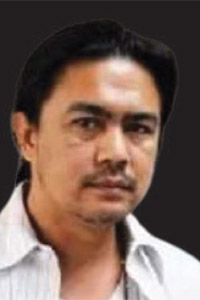Lush coconut trees have long been the symbol of Koh Samui, the country's second-largest island and a famous tourist spot in the southern region. Unfortunately, a vast area of coconut plantations on the island have become plagued with black-headed worm disease which some locals liken to chronic problems that the tourist paradise has experienced.
For many, dying coconut plantations seem to signify the poor situation of the island, once a must-visit destination for local and international tourists alike. The change of land use induced by tourism led to a decline in coconut plantations. Former chief of Koh Samui district agricultural extension office Waichon Yamban said that coconut tree plantation has decreased from over 98,000 rai to 60,000 rai. He believes the iconic trees that make Samui famous will be gone from the island within 60 years.
Some of the problems have come from the island being a top tourist destination which has forced Samui to open its door to strangers. In bygone days, islanders treated their fellow villagers like relatives. With tourism and an influx of strangers into the area, such relationships, together with their traditional way of life, have vanished. And that has given rise to attacks on tourists becoming common. Like it or not, other tourist destinations in the country such as Phuket, Phi Phi, Samet, to name but a few, have shared the same fate as Koh Samui.
It's a result of developing tourism without effective control measures. As tourism booms, the demand for land for resort development increases leading to skyrocketing prices. The island is faced with growing environmental issues including waste problems, water contamination and traffic congestion. Access to beaches has largely been taken away by luxury resorts. Parts of forests have been encroached on and turned into durian plantations which has raised concerns as durian farming requires heavy use of farm chemicals. The most crucial problem, however, is water scarcity, an issue that few people thought would have occurred on this fertile island.
Some locals realise that they can no longer just sit on the problem. Early this month, a group of people led by former university lecturer Pramual Pengchan and other people from Samui launched a march around the island which aims to raise awareness of problems faced by local people. They hope to bring about a turnaround and restore the old Samui they once knew. The march, still going on, involves participants paying respects their ancestors' spirits and Mother Nature. It's expected to end next week.
A native of Koh Samui, Mr Pramual moved to Chiang Mai where he worked as a lecturer on philosophy at Chiang Mai University for 16 years. But love for his hometown made him decide to leave his job in 2006 and move back from Chiang Mai to Samui. When he left Samui for the northern province, he took a small bag of soil with him, and when he returned he brought it back to the place he was born. The former lecturer has decided to do a rally walk around the island at least three times before he dies.
The April 8-May 1 march is his second, during which he aims to trace back the family trees of the locals, an activity called Sao Yan Yot. Mr Pramual believes villagers on the island are all related. The march participants visited 39 communities, and talked to the elders. Mr Pramual hopes this rally which zigzags through mountainous and forested area could restore the old-time feelings and sense of community.
In their talks with community people, the march participants encouraged them to save the forest, grow more trees, and abandon the use of toxic farm chemicals. Such activities, they hope, will help revive watershed in some areas.
"My dream is this march will bring about a change in a better way. That may not happen overnight. This occasion allow me to tell the fellow villagers of my dreams, and they tell me theirs, and we will see if they are the same," said Mr Pramual.
The ultimate goal of the rally walk campaign is to promote civil society.
With support from highly respected pharmacist Krisana Kraisintu, who is known for her alternative medicines for malaria and HIV to help the poor, the campaigners want to promote alternative organic farming, and herbal plantations to be a source of income for locals.
Ms Krisana's house has become a market for these safe, chemical-free products.
"I want to do things that are practical with the use of my expertise, said Ms Krisana who dubbed the project the "Samui Model". It's not an easy task but the expert believes in the potential of Samui people.
Samui has suffered similar degradation to other places such as Phuket and Phi Phi, but what makes the island different is the strong will of local people who want to help bring back its charm.
I hope the "Samui model" will become a success so people can learn from it.
Paskorn Jumlongrach is the founder of www.transbordernews.in.th.
